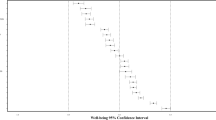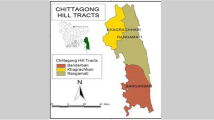Abstract
This paper examines religious influences on personal and societal well-being in South Korea by systematically analyzing recent research on the topic, and by comparing the findings with those of other countries, especially those of North America, to assess similarities and differences. In concert with generally accepted findings elsewhere, the paper shows that Koreans with religious faith generally have higher levels of satisfaction than those without religious faith with respect to such quality of life indicators as income level, interpersonal relationships, job satisfaction, marital life, and health. Among those considered to be religious, Protestants were found to be most satisfied with life, followed by Catholics and Buddhists. It is also clear that individuals with strong religious beliefs, and those who frequently participate in religious activities, are more satisfied with life than those with less strong religious conviction and commitment. With regard to the relationship between religion and societal well-being, this paper shows that religious organizations in South Korea, especially Christian ones, have contributed significantly to societal well-being through their extensive involvement in welfare services, socio-economic activities, such as health care and education, and the democratic movement. What this paper confirms, therefore, is that religious beliefs and practices do matter in the lives of real people: religious resources can help individuals feel more secure, stable and happy; and religious resources also can be mobilized to meet social needs, thereby contribute to societal progress.
Similar content being viewed by others

REFERENCES
Benson, P.: 1992, 'Religion and substance use', in J.F. Schumaker (ed.), Religion and Mental Health (Oxford University Press, New York, pp. 211-220).
Berger, P.: 1967, The Sacred Canopy: Elements of a Sociological Theory of Religion (Doubleday, Garden City, NY).
Bergin, A.E.: 1983, 'Religiosity and mental health: A critical reevaluation and meta analysis', Professional Psychology: Research and Practice 14, pp. 170-184.
Blazer, D. and E. Palmore: 1976, 'Religion and aging in a longitudinal panel', The Gerontologist 16, pp. 82-85.
Call, V. and T.B. Heaton: 1997, 'Religious influence on marital stability', Journal for the Scientific Study of Religion 36, pp. 382-392.
Cha, S.: 1995, Hangukjonggyosasangui sahoehakjok ihae (A Sociological Understanding of Korean Religious Thoughts) (Moonhakgwajisungsa, Seoul).
Choi, J.: 1998, Hangukuijonggyo moonhwaroikneunda (A Survey of Korean Religions from Cultural Perspectives), Volumes 1 and 2 (Sagyejol, Seoul).
Clemente, F. and W. Sauer: 1976, 'Life satisfaction in the United States', Social Forces 54, pp. 621-631.
Cochran, J.K., L. Beeghley and E.W. Bock: 1988, 'Religiosity and alcohol behavior: An exploration of reference group theory', Sociological Forum 3, pp. 256-276.
The Commission on Theological Concerns of the Christian Conference of Asia: 1981, Minjung Theology: People as the Subject of History (Orbis, Maryknoll, NY).
Demerath III, N.J.: 1965, Social Class in American Protestantism (Rand McNally, Chicago).
Dongailbo (Donga Daily Newspaper): 1997, 'Musok-yoksul yulpoong' (Shamanism and Fortune-telling Craze), January 3.
Draper, E., H. Gorges and K. Petersen: 1994, The Almanac of the Christian World/1993-1994 (Tyndale House Publishers, Wheaton, Illinois).
Dull, V.T. and L.A. Skokan: 1995, 'A cognitive model of religion's influence on Health', Journal of Social Issues 51, pp. 49-64.
The Economist: 1995, 'America and Religion', July 8, pp. 19-21.
Ellison, C.G. and J.S. Levin: 1998, 'The religion-health connection: Evidence, theory, and future directions', Health Education and Behavior 25, pp. 700-720.
Fukuyama, Y.: 1960, 'The major dimensions of church membership', Review of Religious Research 2, pp. 154-161.
Gallup Korea: 1985, Hangukinui jonggyowa jonggyosaengwhal (Religion and Religious Life of Koreans) (Gallup Korea, Seoul).
Gallup Korea: 1990a, Hangukinui jonggyowa jonggyosaengwhal (Religion and Religious Life of Koreans) (Gallup Korea, Seoul).
Gallup Korea: 1990b, Hankukinui ingan gachigwan (The Value System of Koreans) (Gallup Korea, Seoul).
Gallup Korea: 1998, Hangukinui jonggyowa jonggyosaengwhal (Religion and Religious Life of Koreans) (Gallup Korea, Seoul).
Gartner, J.D., D.B. Larson and G.D. Allen: 1991, 'Religious commitment and mental health: A review of the empirical literature', Journal of Psychology and Theology 19, pp. 6-25.
Gray, R.E.: 1987, 'Adolescent response to the death of a parent', Journal of Youth and Adolescence 16, pp. 511-525.
Hadaway, C.K. and W.C. Roof: 1978, 'Religious commitment and quality of life in American society', Review of Religious Research 19, pp. 295-307.
Han, Y.: 1987, '1970nyundaeui hangukgyohoewa jeongchi' (Korea churches and politics in the 1970s), Catholicsahoegwahakyeongu (Catholic Social Scientific Research) 1, pp. 107-130.
Hangukjonggyosahoeyeonguso (Research Institute for Korean Religion and Society): 1997, Hangukjonggyoyeongam 1996-97 (The Yearbook of Korean Religion, 1996-97) (Hangukjonggyosahoeyeonguso, Seoul).
Howard, K.: 1998, Korean Shamanism: Revivals, Survivals, and Change (Royal Asiatic Society, Seoul).
Hunsberger, B.: 1985, 'Religion, age life satisfaction, and perceived sources of religiousness: A study of older persons', Journal of Gerontology 40, pp. 615-620.
Idler, E.L.: 1987, 'Religious involvement and the health of the elderly: Some hypotheses and an initial test', Social Forces 66, pp. 226-238.
Johnson, T.: 1995, 'The significance of religion for aging well', The American Behavioral Scientist 39, pp. 186-208.
Joongangilbo (Joongang Daily Newspaper): 1998, 'Jomboneunsaramdeul' (People who frequent fortune tellers), March 6.
Jung, J.: 1986, Hangukjonggyomunhwaui jongae (Introduction to Korean Religions) (Jipmundang, Seoul).
Kendall, K.: 1996, 'Korean shamans and the spirits of capitalism', American Anthropologist 98, pp. 512-527.
Kim, A.E.: 2000, 'Christianity, Shamanism, and modernization in South Korea', Cross Currents 50, pp. 112-119.
Kim, B.: 1985, 'The explosive growth of the Korean church today: A sociological analysis', International Review of Mission 124, pp. 59-72.
Kim, I.: 1998, 'Jonggyogye sahoebokgi chamyeohyunhwang mit hwalseonghwa bangan' (Religious organizations' involvement with social welfare, and measures for expansion), Sahoebokji (Social Welfare) 139, pp. 54-66.
Kim, J., J. Jung and H. Jung: 1982, Hangukgyohoe sungjanggwa shinangyangtaee gwanhanjosayungu (A Study of the Korean Church Growth and Faith) (Hyundaesahoeyeonguso, Seoul).
Kim, M., S. Hong, M. Lee and J. Yu: 1999, Jonggyogyeui sahoebokjihwaldong hyunhwanggwa hwalseonghwa bangan yeongu (A Study on Church Social Welfare Activities in Korea) (Hangukbogeonsahoeyeonguwon, Seoul).
Kim, M. and M. Park: 2000, '—Jonggyoga noinui salmui jile michineun younghyang yeongu' (Research on the impact of religion on the quality of life of the elderly), Journal of the Korean Gerontological Society, pp. 29-47.
Kim, T.: 1972, 'Components of Korean Shamanism', Korea Journal 12(12), pp. 17-25.
Kim, T.: 1973, Hangukjonggyo gaegwan (A Survey of Korean Religions) (Wongwang University Press, Iksan).
Kim, T.: 1981, Hanguk Musok Yungu (A Study of Korean Shamanism) (Jipmundang, Seoul).
Koenig, H.G.: 1988, Religious behaviors and death anxiety in later life', Hospice Journal 4, pp. 3-24.
Koenig, H.G., K.I. Pargament and J. Nielsen: 1998, 'Religious coping and health outcomes in medically ill hospitalized older adults', Journal of Nervous and Mental Diseases 186, pp. 513-521.
Lee, W.: 1988, 'Gyecheungbyul eushikgujowa jonwhanshidaeui gidokkyo' (Class consciousness and Christianity in the changing time), Christian Thought (September Issue), pp. 34-48.
Lee,W.: 1991, 'Jonggyowa inseong tonghap' (Religion and character integration), in W. Lee (ed.), Jonggyo sahoehak (Hanguksinhakyeonguso, Seoul, pp. 153-193).
Lee,W.: 1992, Hangukgyohoeui sahoehakjok ehae (A Sociological Interpretation of the Korean Church) (Sungsuyungusa, Seoul).
Lee, W.: 1997, Jonggyosahoehakuiihae (Understanding the Sociology of Religion) (Nanam Publishing House, Seoul).
Lee, Y.: 1994, '—Jonggyo mit sahoehwaldongi noinui sanghwalmanjokdoe michineun younghyange gwanhan yeongu' (Research on the impact of religion and social activities on the happiness of the elderly), Chungbuksahoebokjiyeongu (Chungbuk Social Welfare Research) 3, pp. 243-273.
Lehrer, E. and C. Chiswick: 1993, 'Religion as a determinant of marital stability', Demography 30, pp. 385-403.
Levin, J.S. and H.Y. Vanderpool: 1991, 'Religious factors in physical health and the prevention of illness', Prevention in Human Services 9, pp. 41-64.
McCann, R.V.: 1962, The Churches and Mental Health (Basic Books, New York).
Maton, K. and E.Wells: 1995, 'Religion as a community resource for well-being: Prevention, healing, and empowerment pathways', The Journal of Social Issues 51, pp. 177-193.
Moberg, D.: 1979, 'The development of social indicators of spiritual wellbeing for quality of life research', in D. Moberg (ed.), Spiritual Well-Being (University Press of America, Washington, D.C.), pp. 1-14.
Moon, S.: 1982, 'Shamanism in Korea', in S. Chun (ed.), Korean Thought (Sisayongosa, Seoul), pp. 17-35.
National Statistical Office: 1995, Ingujutaek chongjosa (National Census).
Noh, G.: 1989, '—Hangukjonggyosungjangui sahoejokbaegyung' (Social factors in religious growth in Korea), in W. Lee (ed.), Hangukgyohoewa sahoe (Korean Church and Society) (Nadanchulpansa, Seoul), pp. 94-126.
Paloutzian, R.F. and L.A. Kirkpatrick: 1995, 'Introduction: The scope of religious influences on personal and societal well-being', The Journal of Social Issues 51, pp. 1-11.
Pargament, K.I.: 1997, The Psychology of Religion and Coping: Theory, Research, Practice (Guilford Press, New York).
Pollner, M.: 1989, 'Divine relations, social relations, and well-being', Journal of Health and Social Behavior 30, pp. 921-1004.
Ro, B. and M. Nelson (eds.): 1995, Korean Church Growth Explosion, Rev. ed. (Word of Life Press, Seoul).
Ryu, S.: 1987, Gidokgyo Yebaewa Yugyojesa (Christian Service and Confucian Rite) (Yangsuhgak, Seoul).
Seoul National University Population and Development Research Center: 1991, Jonhwangiui hankuksahoe: 1990 kukminuishik josa (Korea at a Turning Point: 1990 Survey of Korean Attitudes).
Spilka, B., R.W. Hood, Jr. and R.L. Gorsuch: 1985, The Psychology of Religion: An Empirical Research (Prentice-Hall, Englewood Cliffs, NJ).
Stark, R. and W.S. Bainbridge: 1985, The Future of Religion: Secularization, Revival and Cult Formation (University of California Press, Berkeley).
Tix, A.P. and P.A. Frazier: 1998, 'The use of religious coping during stressful life events: Main effects, moderation, and mediation', Journal of Consulting and Clinical Psychology 66, pp. 411-422.
Ventis, W.L.: 1995, 'The relationships between religion and mental health', Journal of Social Issues 51, pp. 33-48.
Wildes, K.: 1996, 'Ordinary and extraordinary means and the quality of life', Theological Studies 57, pp. 500-512.
Author information
Authors and Affiliations
Rights and permissions
About this article
Cite this article
Kim, A.E. Religious Influences on Personal and Societal Well-being. Social Indicators Research 62, 149–170 (2003). https://doi.org/10.1023/A:1022641100109
Issue Date:
DOI: https://doi.org/10.1023/A:1022641100109



